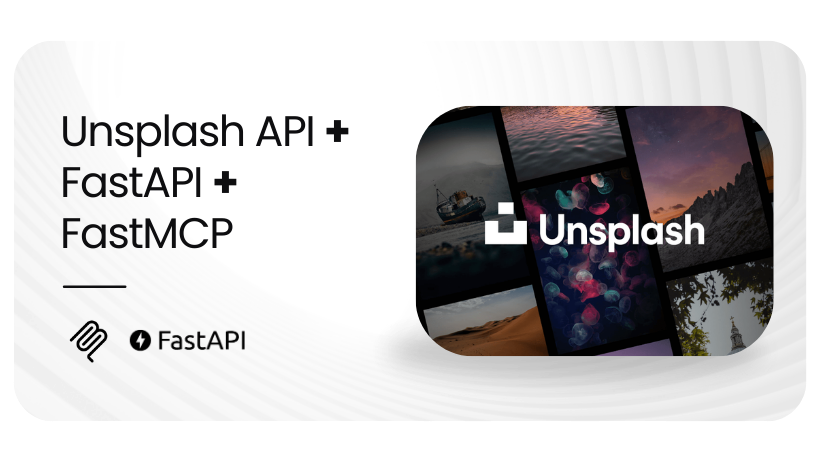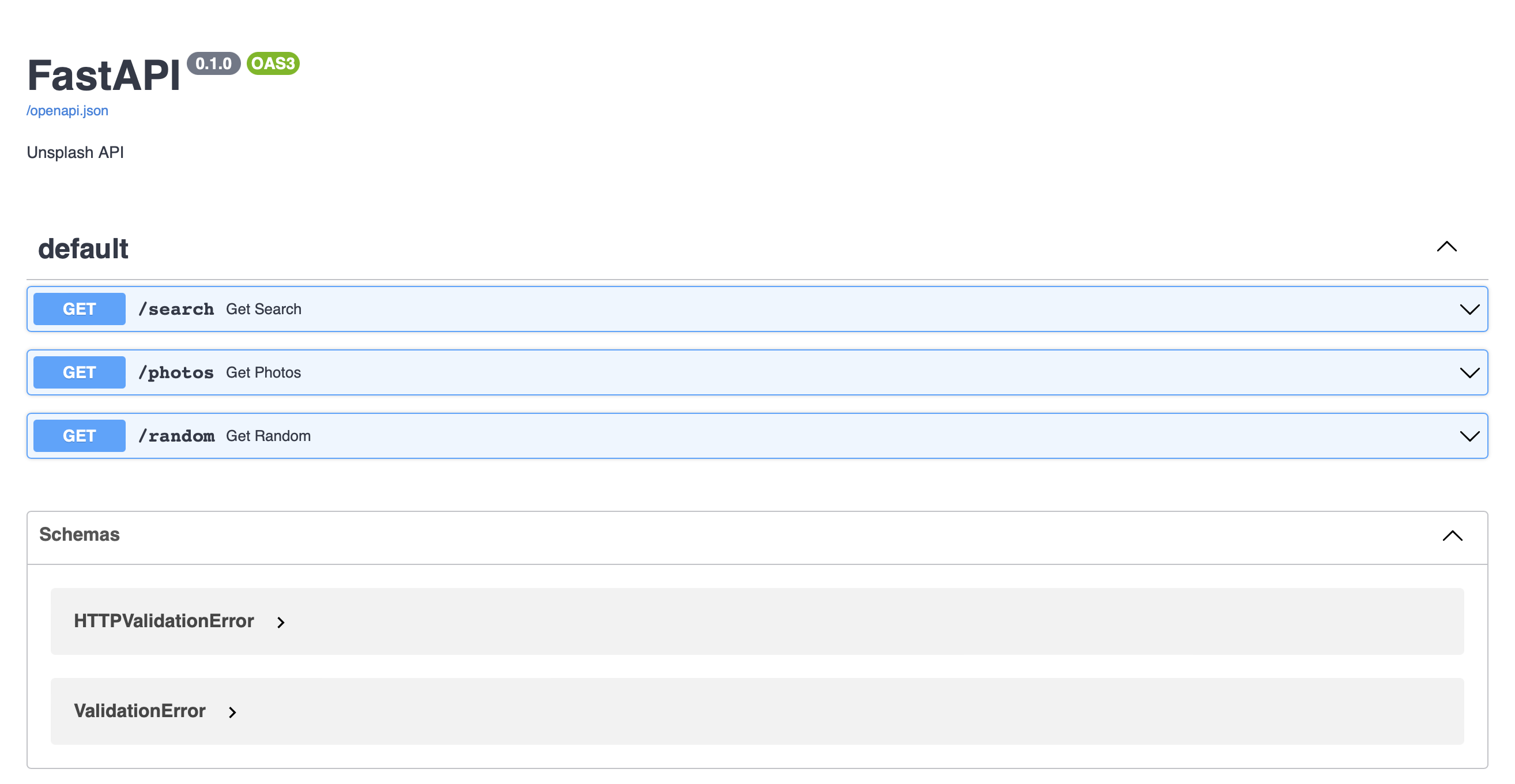- Explore MCP Servers
- Unsplash-MCP
Unsplash Mcp
What is Unsplash Mcp
Unsplash-MCP is an API that provides access to the Unsplash service, allowing users to search, list, and retrieve random images. It is built using FastAPI and integrates the Model Context Protocol (MCP) to enable AI models to interact with the Unsplash API directly.
Use cases
Use cases for Unsplash-MCP include building image galleries, creating content for blogs or websites, enhancing AI models with visual data, and developing applications that require dynamic image content.
How to use
To use Unsplash-MCP, first register as a developer on Unsplash to obtain an Access Key. Then, configure the key in the ‘.env’ file as ‘UNSPLASH_CLIENT_ID’. You can install the server using pip or Docker, and access various API endpoints for searching and retrieving images.
Key features
Key features of Unsplash-MCP include the ability to search for images, retrieve a list of photos, and get random images. It also supports integration with AI models through MCP, enhancing the interaction capabilities with the Unsplash API.
Where to use
Unsplash-MCP can be used in various fields such as web development, mobile applications, and AI projects where image retrieval is required. It is particularly useful for applications that need high-quality, royalty-free images.
Overview
What is Unsplash Mcp
Unsplash-MCP is an API that provides access to the Unsplash service, allowing users to search, list, and retrieve random images. It is built using FastAPI and integrates the Model Context Protocol (MCP) to enable AI models to interact with the Unsplash API directly.
Use cases
Use cases for Unsplash-MCP include building image galleries, creating content for blogs or websites, enhancing AI models with visual data, and developing applications that require dynamic image content.
How to use
To use Unsplash-MCP, first register as a developer on Unsplash to obtain an Access Key. Then, configure the key in the ‘.env’ file as ‘UNSPLASH_CLIENT_ID’. You can install the server using pip or Docker, and access various API endpoints for searching and retrieving images.
Key features
Key features of Unsplash-MCP include the ability to search for images, retrieve a list of photos, and get random images. It also supports integration with AI models through MCP, enhancing the interaction capabilities with the Unsplash API.
Where to use
Unsplash-MCP can be used in various fields such as web development, mobile applications, and AI projects where image retrieval is required. It is particularly useful for applications that need high-quality, royalty-free images.
Content
Unsplash API - FastAPI + FastMCP

Forked from unsplash-api by @aliosmankaya
Table of Contents
- Overview
- Prerequisites
- Installation
- Configuration
- Running
- API Endpoints
- MCP Integration
- Development
- License
Overview
This project provides an API to access the Unsplash service, allowing you to search, list, and get random images. Additionally, it integrates the Model Context Protocol (MCP), enabling AI models like Claude to interact directly with the Unsplash API.
Prerequisites
Before using the Unsplash API, you need to:
- Register as a developer on Unsplash
- Obtain your Access Key
- Configure the key as
UNSPLASH_CLIENT_IDin the.envfile
Installation
Using pip
# Clone the repository
git clone https://github.com/your-username/unsplash-api-mcp.git
cd unsplash-api-mcp
# Install dependencies
pip install -r requirements.txt
# Configure environment variables
cp .env.example .env
# Edit the .env file and add your UNSPLASH_CLIENT_ID
Using Docker
# Clone the repository
git clone https://github.com/your-username/unsplash-api-mcp.git
cd unsplash-api-mcp
# Configure environment variables
cp .env.example .env
# Edit the .env file and add your UNSPLASH_CLIENT_ID
# Build and start the container
docker compose up -d
Configuration
Create a .env file in the project root with the following content:
UNSPLASH_CLIENT_ID=your_access_key_here
Running
Locally
python main.py
The API will be available at http://localhost:8000.
With Docker
docker compose up -d
The API will be available at http://localhost:8000.
Access the interactive API documentation at http://localhost:8000/docs.
API Endpoints

Search
Endpoint to search for images on Unsplash.
Endpoint: /search
Method: GET
Parameters:
query: Search term (Default: “nature”)page: Page number (Default: 1)per_page: Number of photos per page (Default: 10)order_by: Photo ordering (Default: “relevant”, Options: “relevant”, “latest”)
Request Example:
GET /search?query=mountains&page=1&per_page=5&order_by=latest
Response Example:
Photos
Endpoint to list photos from the Unsplash landing page.
Endpoint: /photos
Method: GET
Parameters:
page: Page number (Default: 1)per_page: Number of photos per page (Default: 10)order_by: Photo ordering (Default: “latest”, Options: “latest”, “oldest”, “popular”)
Request Example:
GET /photos?page=1&per_page=5&order_by=popular
Response Example:
Random
Endpoint to get random photos from Unsplash.
Endpoint: /random
Method: GET
Parameters:
query: Search term to filter random photos (Default: “nature”)count: Number of photos to return (Default: 1, Maximum: 30)
Request Example:
GET /random?query=ocean&count=3
Response Example:
For more information about the Unsplash API, see the official documentation.
MCP Integration
MCP Overview
The Model Context Protocol (MCP) is a protocol that allows AI models to interact directly with APIs and services. This implementation uses FastAPI-MCP to expose the Unsplash API endpoints as MCP tools.
MCP Endpoints
The MCP server is available at /mcp and exposes all API endpoints as MCP tools:
- search: Search for images on Unsplash
- photos: List photos from the landing page
- random: Get random photos
Using with AI Models
AI models that support MCP can connect to this API using:
http://your-server:8000/mcp
For Claude, you can configure the connection in the model settings or via API.
Example Client
You can test the MCP server with a simple Python client:
import requests
def test_mcp_metadata():
"""Test if the MCP server is working correctly."""
response = requests.get("http://localhost:8000/mcp/.well-known/mcp-metadata")
if response.status_code == 200:
print("MCP server working correctly!")
print(f"Response: {response.json()}")
else:
print(f"Error: {response.text}")
def list_mcp_tools():
"""List the available tools in the MCP server."""
response = requests.post(
"http://localhost:8000/mcp/jsonrpc",
json={
"jsonrpc": "2.0",
"id": 1,
"method": "mcp/list_tools"
}
)
if response.status_code == 200:
print("Available MCP tools:")
for tool in response.json()["result"]["tools"]:
print(f"- {tool['name']}: {tool['description']}")
else:
print(f"Error: {response.text}")
if __name__ == "__main__":
test_mcp_metadata()
list_mcp_tools()
For more information about using MCP, see the MCP_USAGE.md file.
Development
To contribute to development:
- Clone the repository
- Install development dependencies:
pip install -r requirements.txt - Create a
.envfile with your Unsplash API key - Run the server in development mode:
python main.py
License
This project is licensed under the MIT License - see the LICENSE file for details.
